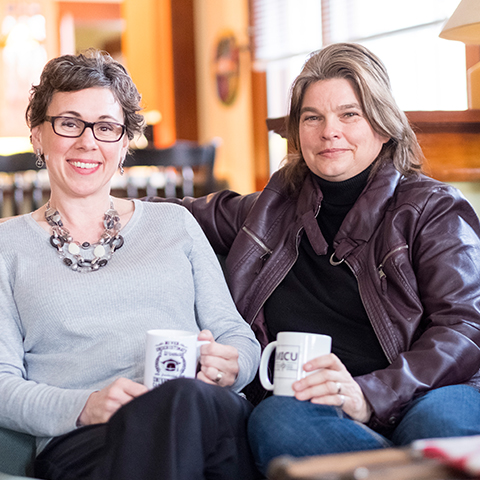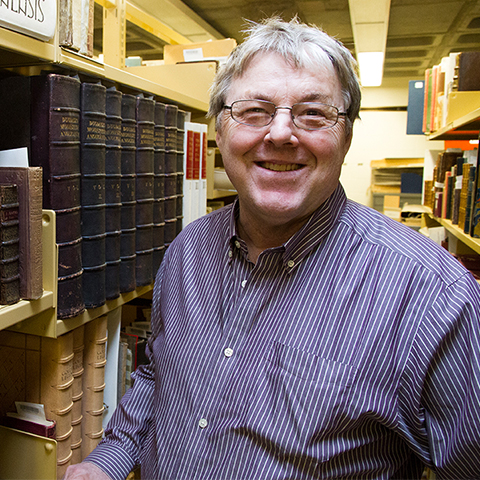Beyond the rainbow
U of S alumni are planting new flags for LGBTQ advocacy
By HenryTye GlazebrookA call to mobilize
It all started with then-Minister of Justice Frank Quennell, his voice buzzing over CBC radio airwaves, declaring in 2004 that Saskatchewan had no plans to proactively pursue legalizing same-sex marriage.
The province would instead await the federal government’s ruling on the matter, he reported, but would not contest anyone who might challenge the law.
And for Kelley Moore (MA’13) and Lenore Swystun (MA’96), that statement may as well have come with a court summons.
“Lenore and I, being who we are, took that as a bit of a rally call to mobilize, to help them to change the law by giving them a reason to,” said Moore. “We had been together almost five years, and for us it was about equality and having the same rights as anyone else in a committed relationship.”
The resulting denial of a marriage license was the first step toward a courtroom, where Moore and Swystun would join four other couples in a landmark case that won same-sex partners across Saskatchewan their legal right to wed in November of that year.
It was hardly the first time either of them had stepped into the spotlight, forthcoming as they’d been in their relationship throughout their personal lives and even into Swystun’s time as Saskatoon’s first openly gay city council member, but the sheer magnitude of the decision to take action wouldn’t hit home until later.
“It was incredibly overwhelming to be in all these newspapers,” Moore said. “It’s one thing to be out within your own community and social circle, and then it’s another to be out across the entire country. It was probably the first time when I realized the importance of what we had done.”

The exposure proved good and bad, with friends and family coming forward in the days and months following. Sometimes they’d show support, sometimes they’d question their decisions. But the fallout was more than worth it to know Swystun and Moore had done something real to help others and to set the stage for those who would one day follow their tracks.
“We came on the shoulders and the backs of so many other couples before us,” Swystun said. “You’re always thankful that others had come before and opened a lot of gates and doors, and now we’re taking the next gate and door and hopefully opening it, too.”
Holding the gate
It’s people like Joe Wickenhauser (BA'09) that the duo see when they glance backward at the generation sprinting behind them, gaining on their achievements with every passing day.
Wickenhauser, executive director of Moose Jaw Pride and the Saskatchewan Pride Network, is breaking new ground in the province’s rural regions doing whatever he can to help the people in towns that have little or no LGBTQ supports in place.
“I drive by a lot of these small communities thinking, ‘Oh, jeez, I wonder what it’s like for that one gay person who lives in this community who isn’t out or who doesn’t know that there’s maybe some others?’” Wickenhauser said. “That must be so difficult.”
The path to Wickenhauser’s current role began with his York University master's project, which saw him exploring Moose Jaw, sitting down with older gay men and listening, intently, as they shared their lives with him. The goal was to better understand the city’s LGBTQ history from the accounts of some of those who lived it firsthand.
The process inspired a fascination in Wickenhauser, who began enthusiastically spreading the word on what his research had unveiled.
Soon he was leading walking tours at the University of Saskatchewan and around Saskatoon, highlighting prominent spaces in LGBTQ history and hosting recreations of a more than 100-year-old-photo of two women kissing on campus, complete with costumes for participants. He even curated an exhibit on gender and sexual diversity at the Moose Jaw Museum and Art Gallery, the first of its kind in Saskatchewan.
“There’s tons of LGBTQ history in this province and many people don’t know about it,” he said. “Often I think it’s because those histories in the past weren’t the sort of content that you’d find in a history book, but there is quite a bit and there’s documentation and archival evidence.”
Now Wickenhauser is trying to stitch a connective tissue between the pockets of LGBTQ groups peppered across the province, not just in medium-sized cities like Swift Current, Weyburn or Estevan but also smaller centres like Melville, Maple Creek or Beardy's and Okemasis First Nation—the pass-through towns where there may not be the necessary population to justify permanent support.
“Some of these smaller communities really surprise you in their support,” he said, recalling the first rainbow flag raising he helped coordinate in Weyburn, which had expected to pull in as few as 20 people and instead inspired more than 100 attendees to take a stand for themselves or in solidarity.
“The number of people who want to be a part of creating changes that are progressive, welcoming, forward-thinking—is neighbourly, really—can totally surprise you,” said Wickenhauser.
It’s these moments that encourage the hope that, with work and patience, these communities might one day be able to prop up educational programs, community assistance centres, and pride events with roots as deep as those found in more populous regions.
Building bridges
OUTSaskatoon is structured around community-building for LGBTQ people of all ages, providing peer-support and counselling, outreach, year-round events and the Pride Home, a long-term youth home for LGBTQ youth aged 16-21.
The organization has carved out a place for itself as a community pillar of the city, with people of all stripes walking through its doors seeking aid or simply offering up their own time to help others.
And for at least one staff member, the group’s help (then known as the Avenue Community Centre) proved critical in his own experience coming out at the tender age of 13.
“I walked through those doors and I grabbed a pamphlet—and I still actually have one of those old pamphlets—and I took it to my family and said, ‘Well, I’m gay. Here are some resources to help you, if you need help,’” said Jack Saddleback, who now works with the group as its culture and project co-ordinator.
“It’s full circle now, how many years later. I’m working in the organization, helping to create this educational change, this systemic change, this societal change.”
Saddleback has built his career around the unique, potent cocktail that is his perspective as a Cree, transgender, gay man, beginning as he settled into the University of Saskatchewan in 2011.
Noticing a gap between the campus LGBTQ community and the Indigenous Students Council, Saddleback rolled up his sleeves and got to work bridging the two, first as U of S Students’ Union Pride Centre co-ordinator, then through planning gender-neutral sweats, pipe ceremonies and other events and eventually as the third-consecutive First Nations—and first-ever openly gay—USSU president.
The greatest accomplishment in Saddleback’s mind, however, came when he helped successfully lobby to have the university’s discrimination and harassment policy amended to include gender identity, gender expression and two-spirit identity. It’s an achievement he believes solidified the campus as an inclusive, forward-thinking institution.
“I’ve had many conversations with young people who are considering the U of S as a place to study, but they reach out to me wondering if it is a safe place as well,” Saddleback said. “To have two-spirit rights included in the discrimination policy was huge. Going forward, I don’t have to worry that those rights will be infringed upon. We're leaders when it comes to these initiatives around the world.”
Leading from the sidelines
Katie Miyazaki (MA’13) is just as eager to see her alma mater forge new paths for LGBTQ inclusion, education and awareness, but she’s more comfortable pursuing these goals on the basketball court than she is through policy or boardrooms.
Long before she had even begun thinking about dating, Miyazaki spent the majority of her youth chasing footballs or lacing hockey skates. Even then, she couldn’t fathom the way some people looked at her, other players, and even coaches simply because they were women in male-dominated arenas.
“Everyone just assumes that they know something about you just because you play certain sports,” she said. “I remember when I was playing hockey, I had two female coaches who were partners and we had some parents who would make homophobic comments about them. I was about 12, and I couldn’t believe what I was hearing.”
Today Miyazaki is off the court and on the sidelines, having successfully transitioned from playing Huskies basketball into coaching high-performance wheelchair basketball, and is a staunch supporter of making sports inclusive to all. She was a vocal advocate of the U of S when it hosted the You Can Play Project, an organization aimed at challenging the cultural norms associated in sports by focusing on athletes’ skill first and foremost.
“Sports should always be a safe space, and as a former member of the Huskie athletics you get to play a big role in the community and you should be using that for good,” she said.
A perfect, beautiful day
After their victory in court, Moore and Swystun waited two years as their lives returned to normalcy before tying the knot. They invited their closest friends and family members to a potluck in their backyard, hoping that a low-pressure affair would keep anyone from losing their invitation over politics.
“It was kind of funny because our one friend brought roses, my sister had a feeling something was up and she brought a gift, another friend brought a fruit cake and then we had a friend who was a United minister,” Moore said. “Between all of that we had the making of a wedding.
“It was a perfect, beautiful day.”
More than a decade later, both women see clearly that their win in court was only one step in the larger fight for equality. They see it when marginalized people of all kinds come to them for help finding work. They see it when clients Google their names and a look of shock spreads across their faces. They see it when they still have to plan trips abroad around which countries won’t turn them away at the border due to their sexual preferences.
But progress—large or small—is still progress, and they both know the best way to prevent slipping backward is to keep pushing forward.
“The work never stops,” Swystun said. “People think that once you get your driver's license or your marriage license that they’re there, but these are privileges. You have to continue to work on them to enshrine them as a privilege and as a right.”
Remembering Neil Richards

Neil Richards, community activist, U of S librarian, and donor, made it his life’s work to preserve, gather and document the heritage of LGBTQ communities.
Between 1985–2015, Richards entrusted his enormous collection of LGBTQ archives to the University of Saskatchewan library. It was one of the earliest and largest collections of LGBTQ interest to be acquired by a Canadian public archive.
Throughout his life, Richards was involved with many provincial and national LGBTQ organizations. In April 2018, Richards received a Saskatchewan Order of Merit posthumously for his work as an LGBTQ archivist and activist.


